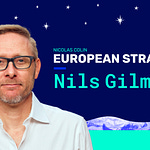The Agenda 👇
Chris Bruntlett talks about cycling in cities in the latest episode of the Building Bridges podcast
A complementary reading list on the future of urban transportation
Thumbs up/down for last week, and a few unlocked articles from the archive
Here’s my investment thesis in a few bullet points:
we long thought that the only playbook to build tech companies was that of Silicon Valley;
but then China opened our eyes to the existence of a very different playbook;
since these two radically different playbooks co-exist, maybe there are many others;
in particular, there must be such a thing as a European playbook, which we still have to discover.
When I voice this thesis, people immediately jump to the next round of questions: What’s this uniquely European playbook? What makes Europe different from the US and China? What are our strengths and how can we Europeans play on them?
This, I must say, is the holy grail of investing in Europe. Any investor with a deep understanding of what makes Europe unique has an edge over US competitors and any locals that don’t know how to do anything other than to emulate Americans.
Plus, learning to differentiate your approach to the market in Europe is good training for doing the same in the many other regions in the world where successful tech companies are now growing at a fast pace. Again, the key to success in venture capital at the global level is not to replicate the same approach everywhere, it’s to understand the local context and adjust investment decisions accordingly. It’s true in Europe, but it’s also true in Southeast Asia, the Middle East, Latin America, Africa, and elsewhere.
But still, what about Europe? One of my findings is that the best way we Europeans can learn about ourselves is by asking outsiders what they think, whether they’re from the US, Asia or other parts of the world.
Another finding is that what Americans, in particular, admire the most about Europe is our cities: their density, their vibrancy, the quality of their infrastructure, the beauty of their architecture, and generally how rewarding and convenient life can be when you live in a large European city.
If you follow that path, a key to understanding Europe’s entrepreneurial potential is to get a better understanding of what makes its cities different—whether that’s housing, retail, healthcare, proximity services, transportation, or any other aspect of urban life. And since I came to this realization, a big part of my thinking as a European investor has been focused on cities: what makes them different from cities on other continents, and what unique opportunities can be seized by European entrepreneurs as a result?
All of this is why I was especially interested to listen to my wife Laetitia Vitaud’s conversation with Chris Bruntlett, a cycling enthusiast, the Marketing Manager at the Dutch Cycling Embassy, and, together with his wife Melissa Bruntlett, author of several books about urban mobility. Chris is a Canadian who moved to the Netherlands specifically because he was attracted by the Dutch urban way of life and what makes it so unique: the key role that bicycles play in day-to-day transportation. As Laetitia wrote on the Building Bridges website,
When you look at the infrastructure decisions made in the Netherlands in the 1970s, you see that they were designed as very democratic and inclusive infrastructures: the old use them, people with disabilities use them, so do families with children. Cycling is cheap. And it has the potential to transform our (work) lives for the better.
👉 You can listen to the whole conversation between Chris and Laetitia by using the player above 👆 or on Apple Podcasts or Spotify.
As a complement to the Building Bridges podcast with Chris Bruntlett, please enjoy this reading list on the future of transportation in cities:
This is the year a major European city will ban cars from its centre (Martin Mignot, Wired UK, January 2020)
11 cities that have joined the car-free revolution (Adele Peters, Fast Company, January 2020)
Coronavirus: a huge push for cycling to work (Robert Wright, The Financial Times, May 2020)
Bikes starting to push cars out of cities thanks to COVID-19 (Florence Schulz, Euractiv, May 2020)
Now is the moment for European cities to get a move on and leave cars behind (Emily Brooke, Sifted, May 2020)
Cities Have a Small Window to Save Themselves From Cars (David Zipper, Slate, May 2020)
Why We Need Feminist Cities (podcast w/ Leslie Kern—Laetitia Vitaud, Building Bridges, October 2020)
Mass Transit Is the Way to Get Cities Moving Again (Lionel Laurent, Bloomberg, July 2021)
Welcome to the 15-minute city (Natalie Whittle, The Financial Times, July 2021)
The Gender Divide in Transport Is Starting to Crumble (Carolynn Look and Elisabeth Behrmann, Bloomberg CityLab, July 2021)
How to end the American dependence on driving (Gabby Birenbaum, Vox, September 2021)
😀 After 10 years in Paris (from 2006 to 2015) and then 5 years in London (from 2015 to 2020), my family and I have been experimenting with escaping from the big cities, moving from London to rural Normandy at the start of the global pandemic, and then from Normandy to suburban Bavaria in November of last year. Read a few related ideas in my Household Finance in the Entrepreneurial Age.
Another interesting experience of escaping the Big City has been that of my friend Stefano Bernardi, an investor who’s been living in the Dolomites (from San Francisco) for several years, and has now launched a project named Trento Remote to provide everyone with the opportunity to join him in this experience. Read Stefano’s announcement here: Launching Trento Remote: a curated batch for remote mountain living ⛰
🙂 They did it again! Our friends at Index Ventures have been at the forefront of pushing for simpler, better approaches to granting stock options to employees of European tech startups, most notably with the #NotOptional campaign about which I wrote in my 2019 essay Why Employee Equity Matters. Now the very same team has launched a powerful tool to help early-stage founders plan and execute on bringing their early employees in as shareholders. Check it out here: Index Ventures OptionPlan.
😏 A recurring theme of this newsletter is the transition from the Fordist Age, which was dominated by manufacturing, and the Entrepreneurial Age, which is dominated by tech companies. A recurring objection from my readers concerns today’s equivalent of the working class: what will replace those steady, high-quality jobs that manufacturing used to provide? Well, it seems we now have the answer—it’s Amazon: Amazon’s New ‘Factory Towns’ Will Lift the Working Class.
😐 If you want further proof of that trend, just consider how hard Amazon and Walmart are competing on the labor market, as suggested by this article: Amazon and Walmart are Winning the Labor Market Wars. It’s good news for workers, as they can play on the competition so as to obtain higher wages and better benefits. It’s bad news for many other employers in proximity services, who now have to renounce treating workers like crap. Not sure what kind of news it is for us consumers, though!
😒 Luckily for workers at Amazon and Walmart, their jobs tend to be located far away from the dense and expensive metropolitan areas. On the other hand, many workers in proximity services continue to suffer from unaffordable housing and/or long commutes because not enough has been done to build housing over the past decades. It’s a problem that’s at the core of the current malaise within the Western middle class (and beyond!), and hopefully one that can be solved in time. Read more in Sam Bowman, John Myers & Ben Southwood’s The housing theory of everything.
😖 I admit defense industry contracts between France and Australia has never been at the top of my interests. But last week’s cancelling of such a contract in favor of Australia’s partnering with the US and the UK caused such a stir that I had to pay closer attention to the whole thing and its implications from a geopolitical perspective. For a glimpse into how the French reacted to the setback, read Rory Medcalf’s What does the new Aukus alliance mean for global relations? And for more in-depth analysis and commentary, follow Bruno Macaes’s Twitter account:


Sign up to European Straits if you don’t want to miss the next issues 🤗
From Munich, Germany 🇩🇪
Nicolas


















Cycling in European Cities. Readings on Urban Transportation. Thumbs Up/Down.